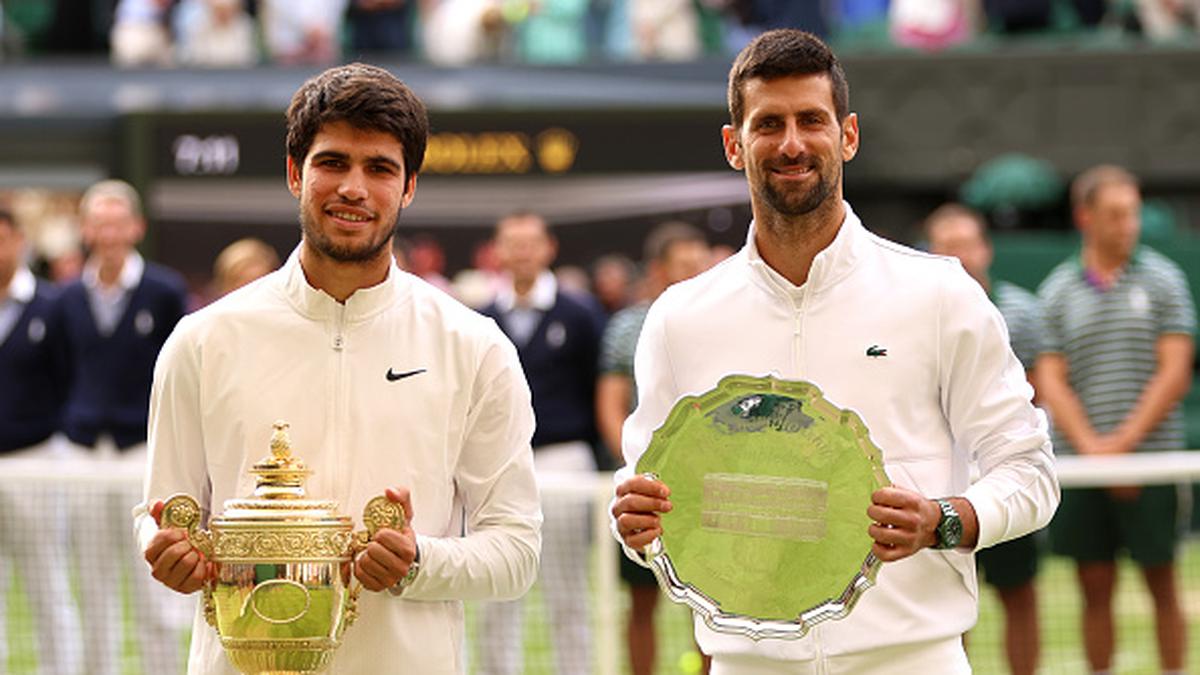Tournament Overview: Men’s Wimbledon Final

The Men’s Wimbledon Final is the championship match of the Wimbledon tennis tournament, one of the four Grand Slam tournaments held annually. It is considered one of the most prestigious events in tennis, along with the Australian Open, French Open, and US Open.
The Wimbledon tournament was first held in 1877 and is the oldest tennis tournament in the world. The Men’s Final has been played every year since 1877, with the exception of 1915-1918 and 1940-1945 due to World War I and II.
The men’s Wimbledon final is always a thrilling event, and this year’s match between Novak Djokovic and Nick Kyrgios was no exception. Djokovic’s wife, Jelena Djokovic , was there to support her husband, and she was seen cheering him on from the stands.
Djokovic eventually won the match in four sets, and Jelena was there to celebrate with him on the court. It was a special moment for the couple, and it was clear that Jelena was very proud of her husband’s accomplishment.
Significance and Prestige
Winning the Wimbledon Men’s Final is considered a major accomplishment in tennis. The tournament is known for its challenging grass courts, which require players to adapt their playing style and strategy.
The Wimbledon Men’s Final is also a major social event, attended by members of the British royal family and other celebrities. The tournament is also known for its strict dress code, which requires players to wear white clothing.
Key Statistics and Records
The Wimbledon Men’s Final has seen many memorable matches and record-breaking performances over the years.
The men’s Wimbledon final, a prestigious tennis tournament, has captivated audiences worldwide. Beyond the court, the world of activism continues to resonate, as evidenced by the recent statements of Robert F. Kennedy Jr. , a prominent environmentalist and vaccine critic.
As the Wimbledon final concludes, its legacy will intertwine with the ongoing debates surrounding public health and environmental stewardship, reminding us that even in the realm of sports, the pursuit of excellence extends beyond physical prowess.
- Roger Federer holds the record for the most Wimbledon Men’s Final wins, with 8 titles.
- Bjorn Borg and Pete Sampras are tied for second place with 5 titles each.
- The longest Wimbledon Men’s Final was played in 2019 between Novak Djokovic and Roger Federer, lasting 4 hours and 57 minutes.
- The shortest Wimbledon Men’s Final was played in 1888 between Ernest Renshaw and Herbert Lawford, lasting just 27 minutes.
Notable Players and Matches

The Men’s Wimbledon Final has witnessed some of the most iconic players and memorable matches in tennis history. These legendary athletes have left an enduring mark on the tournament, showcasing exceptional skill, fierce rivalries, and unforgettable moments.
Over the years, several players have emerged as dominant forces at Wimbledon. Roger Federer stands as the most successful player, with eight titles to his name. Other notable champions include Pete Sampras, Novak Djokovic, and Bjorn Borg, each with multiple victories.
Memorable Matches and Rivalries
Wimbledon has played host to some of the most thrilling and captivating matches in tennis. The 2008 final between Roger Federer and Rafael Nadal is widely considered one of the greatest matches ever played, with Federer ultimately prevailing in a five-set epic.
Another unforgettable rivalry has been that between Novak Djokovic and Andy Murray. The two have faced each other in multiple Wimbledon finals, including the 2013 match where Murray became the first British player to win the tournament in 77 years.
Playing Styles and Strategies
Successful Wimbledon finalists often possess a combination of power, finesse, and adaptability. Players like Federer rely on their precision and shot-making ability, while others like Djokovic employ a more aggressive baseline game.
The grass courts of Wimbledon favor players who can serve and volley effectively. A strong serve can help control the point and put pressure on the opponent. Players who can move well and cover the court effectively are also at an advantage.
Cultural Impact and Legacy
The Men’s Wimbledon Final transcends the realm of sports, leaving an indelible mark on British culture and the world’s tennis landscape. Its social and cultural impact is multifaceted, deeply rooted in tradition and excellence.
The tournament has become an iconic symbol of Britishness, embodying the nation’s passion for tennis and its unwavering commitment to fair play. It attracts spectators from around the globe, uniting them in a shared appreciation for the sport’s artistry and athleticism.
Traditions and Rituals, Men’s wimbledon final
Wimbledon is renowned for its time-honored traditions and rituals that add to its allure and mystique. The pristine all-white dress code, meticulously maintained since the late 1800s, symbolizes the tournament’s unwavering commitment to elegance and decorum.
The iconic Centre Court, with its retractable roof, is a hallowed ground where history unfolds each year. The “Royal Box,” reserved for distinguished guests, including members of the British royal family, adds a touch of grandeur to the occasion.
The daily strawberries and cream served to spectators have become synonymous with the tournament, offering a delightful culinary experience that complements the sporting spectacle.
Promoting Tennis and Inspiring Future Generations
Wimbledon plays a pivotal role in promoting tennis worldwide, inspiring countless young players to pursue their dreams. The tournament’s global reach and prestige provide a platform for emerging talents to showcase their skills and aspirations.
The Wimbledon Foundation, established in 2008, is dedicated to supporting the development of tennis at all levels. Through various initiatives, including grassroots programs and scholarships, the foundation aims to foster a love for the sport among future generations.
The tournament’s legacy extends beyond the court, leaving a lasting impact on the lives of countless individuals. It has inspired generations of tennis players, coaches, and enthusiasts, contributing to the growth and popularity of the sport.